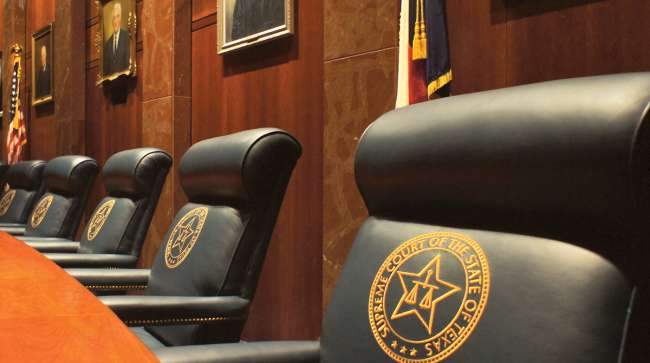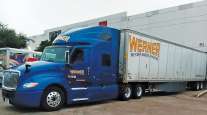Senior Reporter
Texas Supreme Court Hears Werner’s $100M Verdict Appeal

[Stay on top of transportation news: Get TTNews in your inbox.]
Attorneys for Werner Enterprises have asked the Texas Supreme Court to reverse a $100 million verdict against the company in a case involving a fatal accident. The case centers on a 2014 crash in which a pickup truck crossed a median and struck a Werner truck traveling in the opposite direction on a snowy highway.
Werner has during trials in lower courts steadfastly maintained that its driver could not have avoided the crash and did not share any of the fault. However, a Texas jury in a 2018 trial was instructed that it could apply a “proximate cause” legal standard in the case. A proximate cause is defined as a partial cause that was a substantial factor in bringing about an injury, and without which such injury would not have occurred. The court ruled that there was sufficient evidence to support a finding that insufficient training and supervision for the Werner driver behind the wheel at the time “proximately caused the collision.” An appeals court upheld that ruling, prompting Werner to take its case to the state’s highest court.
In oral arguments on Dec. 3, Werner attorney Thomas Wright told the court that Werner driver Shiraz Ali could not have foreseen that a pickup truck would suddenly cross an icy divided highway and strike the carrier’s truck. He further argued that the appeals court deviated from legal precedent in upholding the lower court ruling and “disregarded all the cases from the Texas state courts and around the country’s lower courts.” Wright added that the appeals court “for the first time has held that a driver in his own lane under control of his vehicle is liable when somebody on the opposite side of an interstate highway loses control, spins out, crosses over a 30-foot median plus the shoulders, runs into the driver in his own lane with no time to react.”
Countering Wright’s stance, Supreme Court Justice Jane Bland asked, “Is it reasonably foreseeable that on an icy day that there may be lane intrusion by someone if not this exact scenario traveling across a highway median, but somewhat skidding and entering your lane?”
Wright replied, “It’s certainly foreseeable somebody in the next lane could come into your lane, but you cannot realistically travel down the highway in any kind of weather if you have to anticipate that somebody without warning leave the interstate lane 30 feet across. That’s why they built the interstate highway system, to keep these cars separated. What’s the point of having an interstate?"
John Elliott of Load One demonstrates how onboard video combined with AI-enabled analytics can transform fleet safety. Tune in above or by going to RoadSigns.ttnews.com.
Wright continued, “We believe that the plaintiff’s way to decide the case is to say he had no duty to people across the road. ... If I thought that driving down the [divided] highway afraid that somebody would lose control, come across and hit me and it would be my fault, I might just stay home.”
Arguing on behalf of the plaintiffs in the case, attorney Darrin Walker suggested that the Werner driver should either have been “driving very slow or pulling over during icy conditions and that at the time of the collision was driving too fast.”
“The road was like a skating rink,” Walker said. “It was covered in ice, cars were going off the road left and right, and there were two cross-median collisions in this case.” He acknowledged, however, that the Werner driver did not encounter those crashes.
RELATED: Trucking Leads Growth in Nuclear Verdicts
“In some cases, there may be some circumstances whereas a matter of law a cross-median collision is not foreseeable and the driver does not have to take any precautions,” Walker said, “but in this case, the evidence was clear that a cross-median collision was foreseeable.”
The crash resulted in the death of 7-year-old Zachery Blake, catastrophic permanent injuries to 12-year-old Brianna Blake, significant injuries to 14-year-old Nathan Blake and the Blake children’s mother, Jennifer Blake.
Want more news? Listen to today's daily briefing above or go here for more info
Werner objected to the 2018 jury’s finding that the driver and company were negligent and also to the court judge’s decision to allow certain evidence in the case. Also, Werner objected to the jury’s award of future medical care expenses for the plaintiffs.
Werner maintained that at the time of the accident, Ali was “proceeding in his lane, in control of a Werner tractor-trailer and well below the speed limit, when the [plaintiff’s] vehicle suddenly careened into his path, leaving him no time to avoid a collision.”
Despite this, the lower court jury found both Werner and Ali liable and assessed the award, according to court documents.
RELATED: ‘Nuclear’ Lawsuits Against Truckers Continue to Rise
Trucking industry groups have come forward to support Werner in legal briefs filed with the Texas Supreme Court. They include American Trucking Associations, the Texas Trucking Association, the U.S. Chamber of Commerce and the Texas Civil Justice League.
“In recent years, trucking companies have faced a growing trend of so-called ‘nuclear verdicts’ in highway accident litigation — verdicts that are not only shockingly large, but which, like the verdict here, are fundamentally unfair in that they are untethered to the realities of the case,” ATA wrote in a brief filed with the high court last month.
Werner ranks No. 16 on the Transport Topics Top 100 list of the largest for-hire carriers in North America and No. 4 on the truckload/dedicated sector list. It also ranks No. 30 on the TT100 of the largest logistics companies in North America.





